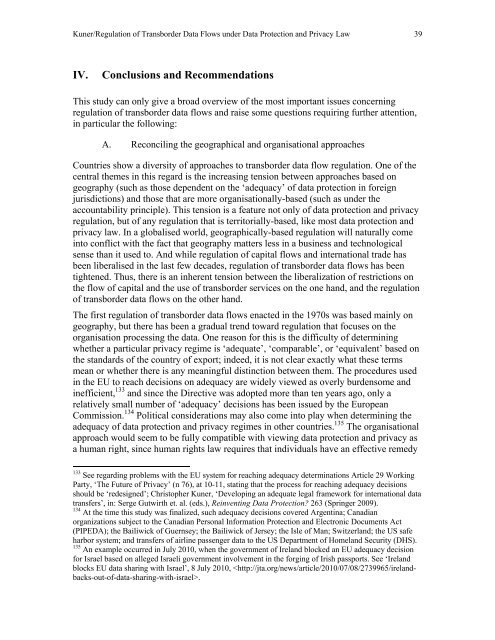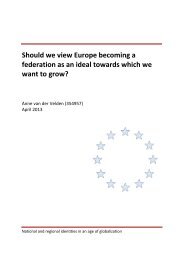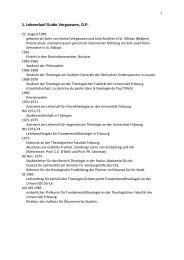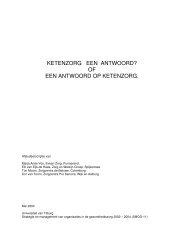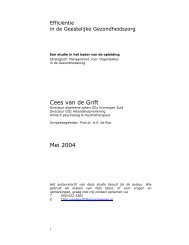Regulation of Transborder Data Flows under ... - Tilburg University
Regulation of Transborder Data Flows under ... - Tilburg University
Regulation of Transborder Data Flows under ... - Tilburg University
You also want an ePaper? Increase the reach of your titles
YUMPU automatically turns print PDFs into web optimized ePapers that Google loves.
Kuner/<strong>Regulation</strong> <strong>of</strong> <strong>Transborder</strong> <strong>Data</strong> <strong>Flows</strong> <strong>under</strong> <strong>Data</strong> Protection and Privacy Law 39<br />
IV. Conclusions and Recommendations<br />
This study can only give a broad overview <strong>of</strong> the most important issues concerning<br />
regulation <strong>of</strong> transborder data flows and raise some questions requiring further attention,<br />
in particular the following:<br />
A. Reconciling the geographical and organisational approaches<br />
Countries show a diversity <strong>of</strong> approaches to transborder data flow regulation. One <strong>of</strong> the<br />
central themes in this regard is the increasing tension between approaches based on<br />
geography (such as those dependent on the ‘adequacy’ <strong>of</strong> data protection in foreign<br />
jurisdictions) and those that are more organisationally-based (such as <strong>under</strong> the<br />
accountability principle). This tension is a feature not only <strong>of</strong> data protection and privacy<br />
regulation, but <strong>of</strong> any regulation that is territorially-based, like most data protection and<br />
privacy law. In a globalised world, geographically-based regulation will naturally come<br />
into conflict with the fact that geography matters less in a business and technological<br />
sense than it used to. And while regulation <strong>of</strong> capital flows and international trade has<br />
been liberalised in the last few decades, regulation <strong>of</strong> transborder data flows has been<br />
tightened. Thus, there is an inherent tension between the liberalization <strong>of</strong> restrictions on<br />
the flow <strong>of</strong> capital and the use <strong>of</strong> transborder services on the one hand, and the regulation<br />
<strong>of</strong> transborder data flows on the other hand.<br />
The first regulation <strong>of</strong> transborder data flows enacted in the 1970s was based mainly on<br />
geography, but there has been a gradual trend toward regulation that focuses on the<br />
organisation processing the data. One reason for this is the difficulty <strong>of</strong> determining<br />
whether a particular privacy regime is ‘adequate’, ‘comparable’, or ‘equivalent’ based on<br />
the standards <strong>of</strong> the country <strong>of</strong> export; indeed, it is not clear exactly what these terms<br />
mean or whether there is any meaningful distinction between them. The procedures used<br />
in the EU to reach decisions on adequacy are widely viewed as overly burdensome and<br />
inefficient, 133 and since the Directive was adopted more than ten years ago, only a<br />
relatively small number <strong>of</strong> ‘adequacy’ decisions has been issued by the European<br />
Commission. 134 Political considerations may also come into play when determining the<br />
adequacy <strong>of</strong> data protection and privacy regimes in other countries. 135 The organisational<br />
approach would seem to be fully compatible with viewing data protection and privacy as<br />
a human right, since human rights law requires that individuals have an effective remedy<br />
133 See regarding problems with the EU system for reaching adequacy determinations Article 29 Working<br />
Party, ‘The Future <strong>of</strong> Privacy’ (n 76), at 10-11, stating that the process for reaching adequacy decisions<br />
should be ‘redesigned’; Christopher Kuner, ‘Developing an adequate legal framework for international data<br />
transfers’, in: Serge Gutwirth et. al. (eds.), Reinventing <strong>Data</strong> Protection? 263 (Springer 2009).<br />
134 At the time this study was finalized, such adequacy decisions covered Argentina; Canadian<br />
organizations subject to the Canadian Personal Information Protection and Electronic Documents Act<br />
(PIPEDA); the Bailiwick <strong>of</strong> Guernsey; the Bailiwick <strong>of</strong> Jersey; the Isle <strong>of</strong> Man; Switzerland; the US safe<br />
harbor system; and transfers <strong>of</strong> airline passenger data to the US Department <strong>of</strong> Homeland Security (DHS).<br />
135 An example occurred in July 2010, when the government <strong>of</strong> Ireland blocked an EU adequacy decision<br />
for Israel based on alleged Israeli government involvement in the forging <strong>of</strong> Irish passports. See ‘Ireland<br />
blocks EU data sharing with Israel’, 8 July 2010, .


